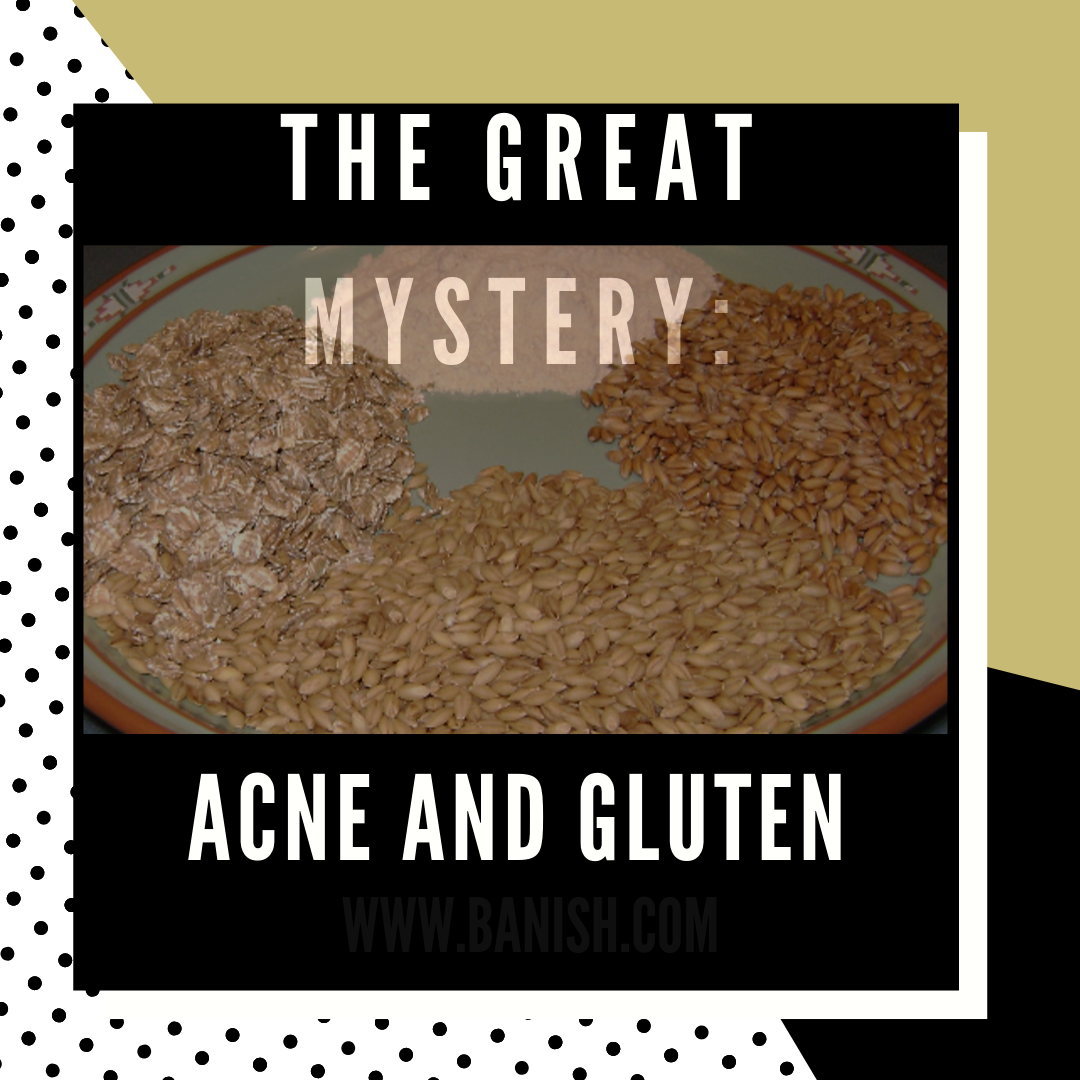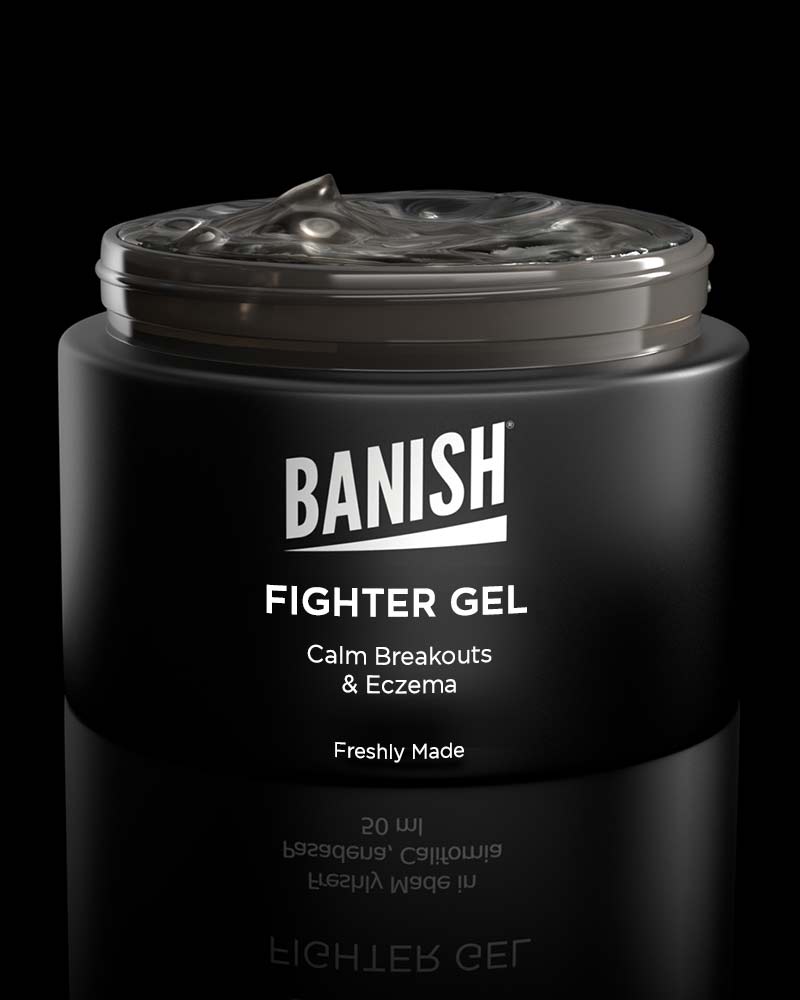Guest Blog By VeganAcneSufferers
Every once in a while, the health community comes together to demonize an ingredient. Soy has had its day, MSG is in the books, and now gluten is under attack.
Since the turn of the century, "gluten-free" is a term that has seen a rise in popularity. All over the internet, and even in person, people are being told the evils of gluten and that to be healthy, we need to stay away from it. Gluten has been blamed for everything from acne to joint pain, migraines, depression, anemia and mouth sores. In fact, a lot of people will attest to the fact that a gluten-free diet has rid them of their acne, their excess weight, their IBS, etc.
If giving up a life of bread and pasta meant clear skin forever would you be on board? Well, if like me, cystic acne has been one of your biggest struggles for years on end you’d do anything for clear skin. And trust me, I’ve tried most of it. If it’s a diet or a cream or a prescription pill-I’ve tried it.The annoying thing with skin is that there isn’t a one size fits all, for some a cream might work and for others it’s as simple as cutting out one particular food group. For me that food group has been gluten.
Dealing with acne can be especially tricky when it comes to treatment through holistic means such as diet. It’s taken me two years of trial and error to finally figure out whats been breaking me out all this time. I have reactions to dairy, eggs, canola oil, corn, and… gluten! For a while there I was in denial about my food allergies, I’m from the Midwest, and we’re not supposed to have sensitivities to things like dairy or gluten.
But I love my whole grain bread, and I'm not willing to give it up without a damn good reason.
Besides, you shouldn't believe everything you hear, and you should be critical of everything you read - especially when there isn't a scientific study or premise in sight. It doesn't hurt to roll your sleeves up and do a little detective work (in the right places - being a detective on a holistic website primed to sell you their detox kit isn't good detective work) for yourself to know for sure.
WHAT IS GLUTEN?
Gluten is the name for the proteins found in wheat, rye, barley, and spelt. Wheat is the most commonly consumed gluten containing grain.Gluten acts like a glue, helping food maintain their shape and determines overall chewiness once baked.
Gluten refers to the proteins found in cereal grain’s endosperm. Gluten both nourishes plant embryos during germination and later affects the elasticity of dough, which in turn affects the chewiness of baked products.
Gluten is actually composed of two different proteins: gliadin and glutenin. Though "true gluten" is sometimes defined as being specific to wheat, gluten is also found in barley, rye and a grain that is a cross between wheat and rye called triticale.
Not all grains contain gluten, though. Some examples of gluten-free grains are sorghum, millet, brown rice, buckwheat, wild rice, amaranth, quinoa, corn (polenta) and teff. Oats are also gluten-free, but can be contaminated during processing, so it’s important to check the certified gluten free label when buying oats!
WORD ON THE STREET
“Wheat Belly” author William Davis, M.D., argues that modern grains are now genetically different, possibly making gluten more abundant in them and therefore “more destructive”. Unfortunately, Davis' book was never peer-reviewed by scientists, so its content holds little weight to me or any scientifically-literate person. David Perlmutter, M.D., author of “Grain Brain”, also speculates that wheat is hybridized to increase gluten content as much as possible. OK, so maybe I was wrong?
But another study by Donald Kasarda, PhD in physical chemistry from Princeton University and expert in grain genetics at the Agricultural Research Service (USDA), found that gluten content in crops hasn’t changed in the past 100 years. Another study, conducted by the University of Saskatchewan and published in Cereal Chemistry, arrived to the same conclusion: gluten composition in grains hasn’t changed much since 1860. Unlike Davis' book, these studies were peer-reviewed, and put that hearsay to rest.
HOW GLUTEN AFFECTS YOUR BODY
Gluten isn’t bad for everybody! It is only bad for those who are gluten sensitive or gluten intolerant, which means your body produces an abnormal immune response for breaking down gluten during digestion.The most well known form is celiac disease,which affects 1 out of every 141 people according to the US department of health and human services.When someone with celiac disease consumes gluten, it triggers an autoimmune response that damages their intestines, preventing them from absorbing vital nutrients. Several indicators of gluten intolerance are:
Pain in the abdomen or joints
Bloating
Diarrhea
Heartburn
Nausea
Flatulence
Anxiety
Cramping
Fatigue
Skin rash
Weight loss
IS GLUTEN SENSITIVITY REAL?
Gluten sensitivity is very real, considering Celiac disease is a severe form of gluten sensitivity. Do milder forms of gluten sensitivity exist?
Yes, it appears so.
Until recently, doctors thought that gluten sensitivity was a “fad”. As far as the medical community was concerned, only Celiac gluten sensitivity was a valid diagnosis.
But a study led by Peter Gibson, professor of gastroenterology at Monash University and director of the G.I. unit at the Alfred Hospital in Melbourne, Australia, showed that gluten can cause gastrointestinal symptoms in people without Celiac disease.
These people are non-Celiac gluten-sensitive, which means that their bodies produce an abnormal immune response when breaking down gluten during digestion, preventing them from absorbing vital nutrients. About 18 million Americans are said to have gluten sensitivity.
After consuming gluten, patients with gluten sensitivity may experience many Celiac disease-like symptoms, such as diarrhea, fatigue, and joint pain, but don't appear to have damaged intestines. These symptoms can also be due to poor digestion or a placebo effect.
ACNE AND GLUTEN?
Unfortunately, at this time there are no studies on the relationship between acne and gluten, and therefore we are left to speculate on what research we do have. Keep an open mind at this point, and be willing to change based on new research.
However, there have been some studies linking gluten to other skin conditions. For example, a Swedish study found that 16% of psoriasis patients are gluten-sensitive. In a follow up study the researchers compared gluten-sensitive psoriasis patients to psoriasis patients without gluten sensitivity, and after 3 months of a gluten-free diet the gluten-sensitive patients had a significant decline in psoriasis severity while the non gluten-sensitive patients showed no improvements. Upon reverting to their normal diet, psoriasis started worsening in more than 50% of the gluten-sensitive people.
Another study cited that as gluten sensitivity increased, so did psoriasis in patients.
There is a known link between gluten-sensitivity and inflammation, and a known link between inflammation and acne, so at the heart of it, it is very possible for gluten-sensitive people to be affected with acne as a result of gluten consumption.
COULD IT BE IBS?
Research has shown for decades the connection between gut and skin health. The chronic gastrointestinal disorder called irritable bowel syndrome (IBS) is another condition that is affected by gluten. IBS affects 7-20% of adults in the United States. Gluten grains are high in starches and sugars that can be easily fermented by intestinal bacteria. This can cause bloating, cramping and/or diarrhea.
IBS is becoming much more common, so it is possible that IBS could be the culprit. Gut problems like IBS can increase systemic inflammation and deplete your antioxidant reserves, and this can indirectly hurt your skin. These problems are much more common among acne patients than the general population.
COULD IT BE A WHEAT ALLERGY?
A wheat allergy is a rare type of allergy that is marked by skin, respiratory or gastrointestinal reactions to wheat allergens, but is not necessarily caused by gluten. Common symptoms of a wheat allergy include:
- Hives or skin rash
- Nausea, stomach cramps, indigestion, vomiting or diarrhea
- Stuffy or runny nose
- Sneezing
- Headaches
- Asthma
- Anaphylaxis (less common)
According to the American College of Allergy, Asthma and Immunology, 65% of children with a wheat allergy outgrow it by age 12. It is unlikely that a wheat allergy is at the root cause. An allergist can determine whether an allergy is present.
COULD IT BE FODMAPS?
The science on gluten sensitivity is evolving and we're learning new information on the condition regularly. New research suggests that gluten alone may not be responsible for the symptoms produced by the condition currently called gluten sensitivity. Instead, it is showing that perhaps FODMAPs (stands for Fermentable Oligosaccharides, Disaccharides, Monosaccharides and Polyols), a group of poorly digested carbohydrates, may be the cause of the symptoms instead. It is also important to note that wheat, barley and rye — gluten-containing grains — are all high in FODMAPs.
Gibson, who spear-headed the research solidifying gluten-sensitivity as a real condition, went in to publish another study indicating that it perhaps wasn't just the gluten to blame. This second study included people with non-Celiac gluten sensitivity and people with IBS. The subjects were put on a low FODMAP diet and when gluten was reintroduced only 8% of them showed negative gluten symptoms. These findings show that perhaps FODMAPs may be the cause of the symptoms together with gluten.
COULD IT BE OTHER INGREDIENTS, AS WELL?
Sensitivity to a FODMAP item tends to happen when you eat a FODMAP ingredient in ultra-concentrated amounts – think high-fructose corn syrup and added sugars in processed foods like pastries, pies, biscuits and cakes, which by the way also contain gluten (as well as gluten-based additives to improve texture). Since acne is affected by insulin spikes and high GI foods, it's also possible that the gluten is just an unwilling accomplice.
SHOULD I GO GLUTEN-FREE JUST TO BE SAFE?
Really, the only people who Gluten should effect, are those who have intolerance. So if you’re not intolerant, then it technically should not be causing a problem. If you’re curious you could always try a 30 day elimination diet by removing gluten from your diet and tracking how you feel or any changes that you notice!At the end of your trial you should be able to tell whether or not gluten is your friend or foe.
Experts worry that going on these diets without explicitly needing to could be detrimental to a person's health, as gluten-free substitutes are often nutrient-deficient. While eating gluten-free doesn't necessarily equate to eating a bunch of gluten-free processed foods, keep in mind that to be palatable, many of these foods will have a lot of added fat, sugar or salt. Eat gluten-free foods like this sparingly. Importantly, many whole grains are also very rich in vitamins and minerals, like vitamins B and D, iron and fiber. If you plan on going gluten-free, ensure you're getting adequate intake of vitamins and minerals.
With this being said, eating healthily while being gluten-free is entirely possible. Substituting wheat and other gluten-containing foods with healthy alternatives like quinoa and millet, all while eating a hearty amount of fresh fruits and vegetables, legumes nuts and seeds, you can still thrive. Processed white flour items like pastries, cakes, and white bread tend to be more "irritating" than whole grains for many, so it's worth it to try opting for healthier gluten options, first.
But if that doesn't work, there's nothing wrong with cutting back on gluten if you find it irritates your digestion and your skin. A simple elimination diet will suffice - eliminating all gluten from your diet for a few weeks to see how your skin and digestion improves. If your skin improves, you can begin the long and tedious journey of trying to determine which forms of gluten (perhaps all) are triggers, or if it's FODMAPs disguised as gluten-sensitivity.
It's always important to get tests done to determine if a gluten-free diet is necessary. Thankfully, gluten sensitivity can be diagnosed by measuring antibodies against gluten (anti-gliadin antibodies or AGA).

IN CONCLUSION
Long story short: Is gluten a problem for people with acne? Yes, it could be for some people, but certainly not for all.
Gluten is not evil, but it is something we need to be mindful of. It may exacerbate your digestion and your acne, but not someone else's. Regardless, reducing consumption of unhealthy gluten like white flour is still a positive, healthy change to make to our diet, whether or not we are gluten-sensitive.
------------------------------------------------------------------------------
























1 comment
Dawid
Interesting stuff thank you
Leave a comment
All comments are moderated before being published.
This site is protected by hCaptcha and the hCaptcha Privacy Policy and Terms of Service apply.